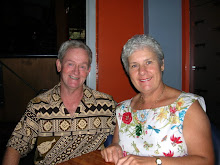
Makongai

Our overnight trip to Makongai was not pleasant. The wind varied in strength from 20-25 knots, and direction, from on the nose to up our stern. It was impossible to sail and though we tried, we ended up motoring most of the way. It was a very dark night, with no moon, punctuated by lightning in all directions and quite a bit of rain. We were very pleased to finally get in to the glorious bay at Makongai. But before having a well-earned rest, we had to visit the leader of the village and make our Sevusevu (offering of Yangona/kava). This offer was accepted and fortunately we were not asked to partake of the kava, which has a slightly muddy taste and leaves a numb feeling on the tongue and lips. Tony was asked if he could fix a light in the house. That was not too difficult for Tony.
This island is government owned and was, until 1969, a leper colony, when it was closed down and then became a government research facility. We took a tour of the old ruins but there is not much left except the jail and graveyard. However it was interesting. There are only four families in the village but there were a very large number of children. So the fertility rate must be high. The villagers all seemed pretty healthy. We wished we had taken our camera ashore because we saw a man pulling a baby along the ground in what would appear to be a trolley. However, it was a rectangular plastic container cut in half with no wheels pulled by a string, much like a sled. The baby looked perfectly happy. We have not seen one pram or pushchair since arriving in Fiji. We also saw a giant clam nursery and a tank with five baby turtles in it. Once the clams and turtles get to a decent size they are released to the ocean. Very little money has been available for any of this work since the Fiji coup and so the facilities are very neglected.
We had a great time snorkelling in the bay. It is amazing the size of some of the clams. Apparently the Japanese are very partial to the muscle, which sometimes weighs about five kilograms. Not far from the shore we saw several old hospital iron beds under water. Guess that is one way of dispensing of unwanted items!
We had planned on leaving that day and travelling to Levuka but with a wind warning out and rough seas, we decided to stay put. Levuka is the original capital of Fiji and is said to be like Fiji was fifty years ago.
The next day, Monday 7 July, the weather was worse with predicted winds of SE, 25-30 knots average, with gusts to 40 knots, which was forecast to get a bit worse and last at least a week. Given the deterioration of the weather we had to regretfully forsake our visit to Levuka and plan a rough but largely downwind sail over the top of Ovalau (the island where Levuka is situated) and head westward. We contacted the catamaran, Emmanuel, which had left a couple of hours earlier and they informed us that the forecast was correct but that they were coping OK. After an “exciting” trip we reached the island of Naigani where we were able to get shelter from the worst of the wind and also the seas were calmer inside the reef. The skipper was finally enjoying the vacation but the first mate was struggling. We had decided to have a swim but the sea was still rough and did not look inviting. So we had an anchor dram and a rest. We set the anchor watch and did not get much sleep that night.
The next morning, Wednesday we set off early into much the same conditions as the previous day in the company of Clint and Adair on Emmanuel (47ft catamaran), but the time in unsheltered waters was less and after about two hours we sailed in to the moderately sheltered reef area which surrounds the main island of Veti Levu. The trip across the top of Veti Levu is a little over 100 miles. We did this over three days as it is necessary to travel between 9:30 am and 3:30pm in order to be able to see the reefs, finally arriving at Lautoka on Friday 11 July, in time to clear customs. We were very appreciative of the many GPS positions which gave clear runs for us through the reefs on our trip which we supplemented with visual navigation as the clearance from some of the reefs is not much! The charts are not accurate and these positions helped us tremendously. Apologies to all those traditional sailors.
Millionaire Territory North of Lautoka

Lautoka, with a population of 43,274 is the second largest city in Fiji and is not a very pleasant place to anchor, but regulations must be followed. The sugar mill, which has been operating there since 1903 belches smoke and soot continually and makes a terrible mess on the boats. We were pleased to leave there as soon as we could and headed five miles SE to the beautiful, sheltered Sawini Bay where we dropped anchor. We slept so well after our long and stressful passage.

Lautoka


















